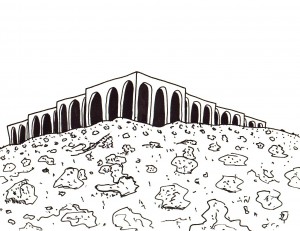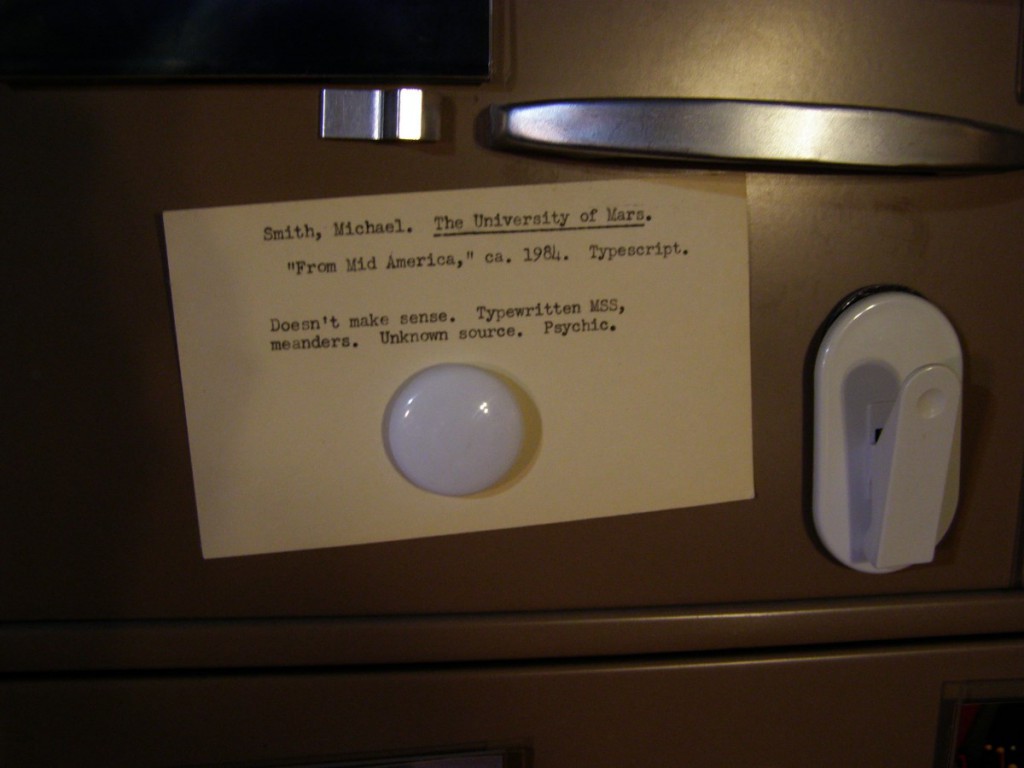Homage Part 1: Farewell to The University of Mars
I culled this post from the sortmind.com University of Mars page. I’ve always enjoyed this essay as a solid analysis of an unpublishable old novel, but it’s really a blog post, lost on a bazillion pages on sortmind.com, so I’m moving it here with much updating.
I wrote the original essay right before the 2009 revision of the novel, but I’ve brought it up to date to reflect the fact that, while in 2009 I judged the 1984 University of Mars to be an unpublishable novel, I’ve long since drawn the conclusion that the 2009 revision is also unpublishable. But the extended struggle over this novel taught me a lot about writing, so I pay homage to it here.
A Good Heart, But Dense and Confused
There was a good-hearted book somewhere in the 320-page typewritten manuscript of The University of Mars. Eleven people read the finished second draft, laughing in the right places and generally complimenting the work, and I was ready to type it and send it to publishers.
It was the first novel I ever submitted for publication. I sent queries to twenty-three publishers and one agent between 1984 and 1986; three of the submissions consisted of mailing the entire novel. The last rejection was November 1986, from the $45 agent.
I could spend a lot of time on the $45 agent. His response incensed me, as he obviously hadn’t bothered to read more than a few pages for his fee, and instead turned the book over to his assistant, who clearly didn’t read much further. They contented themselves with a rich deconstruction of the first two manuscript pages, which in retrospect is an ironic comeuppance for someone who regularly used this trick with English papers at Rice University.
Oddly, the agent’s belabored assertion that the first page’s “Bill felt like” must read “Bill felt as if” is the only comment I remembered for years. Despite my initial defensiveness that the criticism was unfair because Bill was “thinking colloquially” in the first paragraph, I knew I’d been ungrammatical and I’ve since become a stickler for the correct use of “as if.” Even though many writers feel as if that’s not important.
But some time back I ran across the agent’s letter and realized he was exactly right about the weaknesses of the novel. He just didn’t have to be so arrogant about it. Maybe he was angry at having to plow through even a few pages of three-fifths of a ream of paper. I’d probably risk being sued for $45 rather than wade through that entire MS. myself.
My explanation for withdrawing The University of Mars from publication efforts in 1986 wasn’t that I’d lost faith in the novel, but that it merely needed a tune-up. I could admit I hadn’t truly taken responsibility for every word, every mark on the page, but I still considered the novel itself solid, and I had vague thoughts that when I someday got a computer I could easily edit the MS. In any case, I knew I was approaching publishers, as an unknown, with ragged work. Two strikes against me instead of just the one of being unknown.
Yet I remained proud of the book’s best parts, and at one time I’d figured it could be a YA novel if it were stripped of its truly gratuitous obscenity. Even after abandoning all attempts to publish the novel, I still held onto the thought that it could be gussied up and sent out again with some fresh marketing angle.
So it was more than disturbing to take a fresh look at The University of Mars in January 2009 and find the entire novel earnest but dull. While the typed MS. showed some good effort–the opening surrealism in “The Confessions of St. Augustine,” the manic satire in “First Day in Class,” the revelatory murder-suicide in “Don and the Boys”–my unwillingness to see around my own corners was painfully evident throughout.
The eight chapters were cumbersome and overlong–one was sixty-nine pages. There were mindless detours, unnecessary exposition, confusing flashbacks, and dialog giving way to thickets of impenetrable narration. I’d courageously but clumsily kicked my way through the story, slinging paragraphs and concepts around until I achieved some shaky control. Now I saw that your average reader–unless he was one of my eleven friends!–wasn’t going to wade through all that verbiage to appreciate anybody’s shaky control. And yet …
What about the Dream of the Catalog Card?
Library catalog cards have been obsolete since at least the time I typed my manuscript in 1984, but in November 2001 I dreamed of a catalog card about an abandoned novel that no one, except perhaps the dream cataloger, had ever read. Instead of writing down my dream I typed up the catalog card as I remembered it, and I’ve had it on my filing cabinet since.
Early Themes
The University of Mars arose fitfully amid several life themes:
- In late 1979 I reread The Rise and Fall of the Third Reich and was again astounded at the horrifying reality of Nazi Germany as well as the mythic reverberations of the war and its continuing legacies. I also ran across the book Rocket Fighter by Mano Ziegler, a German Me-163 rocket fighter pilot. The fact that this scarcely believable account was in the Dewey 629’s on the first floor of the old Dallas Public Library, where I would shortly begin my library career, was significant.
- I was making my first experiments in creating nurturing life structures: taking the GRE, considering a master of fine arts degree, abandoning that to think about a creative writing degree, abandoning that, looking for new jobs, and finally, considering a library career.
- The idea of a University of Mind had been percolating for several years: an institution of mind and soul representing Civilization in its highest sense–and coincidentally offering me sanctuary from my hated insurance accounting job!
- A related theme was the further evolution of humanity as filtered through the prism of what World War II meant, the mindless evil and the all-or-nothing struggle to eradicate it.
- Despite my paranoia about the nuclear accident at Three Mile Island in March 1979, I eventually realized I wasn’t opposed to legitimate uses of technology, that technology is an indispensable human endeavor. A heretofore unacknowledged fear of technology unknotted and disappeared, opening a pathway to Mars.
Then Scary Aliens Came
Newer themes entered the mix by January 1981:
- I’d already written the chapters “The Flying Saucer Novelist” and “Don and the Boys,” both about terrifying encounters with aliens, without knowing much about the alien visitation literature. Then–again from the first floor of Dallas Public–I picked up The Andreasson Affair and was as much horrified by it as I was by The Rise and Fall of the Third Reich the year before. I read more and more of these extraterrestrial contact books in the 001.942’s at the old library, fascinated and appalled. And so alien Transcendatrons hijacked my manuscript.
- At the same time I realized to my chagrin that my “novel of ideas” was sliding into silly science fiction games. Trying to inject more passion, I launched a Part II incorporating an old idea of incorporating every single detail of the second semester of my sophomore year at Rice–a project quickly doomed to abysmal failure.
Abandoning Draft One
Was tossing in a farcical short story about Nazi Germany entitled “Where Eagles Have Unfortunately Landed” a good idea? What about all the extra plot and exposition necessitated by the convoluted history of the West Texas Revolution of 1999? Was this all just a tired joke? What happened to the initial high energy? Where was the sensuous flood of characters and situations? Where were the sensuous ideas?
As I left my mind-crippling insurance job and began a new career at the library, The University of Mars became ever more a pain to write, the characters flat, the central idea of the Life of the Mind without spark. I finally declared the unfinished experiment over at ten chapters. The decision was made easier by the fact that I’d sighted a better novel.
Censor Breaking and Draft Two
Even as I worked on the early chapters of The University of Mars I had an idea for a completely different kind of novel, not a novel of ideas, not a joke of any kind, but one attuned to dreams and power. From October 1980:
a new novel has been tempting me: a history of someone’s attempts to reach the “real” Other World (of dream topology)–the love of that realm–and bringing it all together in a self living in this world, a counterpoint to the “failed literal” attempt of U of M.
Amid the ongoing confusion about The University of Mars I kept returning to the idea of a psychological novel expressing so much more than what I was currently playing with. I was ready to begin Zarreich and take my writing in a new direction.
Zarreich’s major contribution to my writing career was its censor breaking; I quickly found myself crashing through scenarios which kept breaking all my previous taboos. Even the obscene rock and roll world of my previous novel Akard Drearstone failed to record anything real about male-female relationships. My writing hadn’t been grown up; Akard and The University of Mars couldn’t address real fears and desires of any sort. They often aimed at serious issues but quickly veered into irony and cynicism.
Zarreich became an extremely rich but disordered book. Yet after its 1981-82 draft I saw the way to rewrite The University of Mars into a real novel. I permitted Bill to ponder his feelings for Karen and grapple with their separation, I had my first practice writing from the female character’s point of view, and I saw a way to deepen Karen’s character in an emotionally satisfying ending. This final Chapter Eight was a triumph–though it was naive of me to expect anyone to wade through three hundred pages to get there!
But I felt I had a complete story at last. I was proud of my effort and more than ready to send it to publishers.
Typing a Manuscript is an Irrevocable Commitment
It’s much more final than a computer printout. You’re setting concepts in paper stone as you mortgage months of your writing time. A mistake or a revision of a couple words can involve twenty minutes of retyping an entire page. A major revision of the first chapter throws off the pagination of the entire manuscript! Retype, or messily fudge it with “continued on page 35”? And when you’re done with the unspeakable ordeal of hacking out hundreds of pages, but make the mistake of rereading Chapter Six and finding yourself dissatisfied with some verbiage, you simply … try to ignore the problem …
I was hazily aware that screw-ups could be instantly corrected on one of the new-fangled word processors, but I didn’t own a computer and had no idea how to use one. So I typed 320 pages of The University of Mars on my 1940’s manual Royal typewriter. Yet over the next couple years, as I sent out query letters and battered photocopies of sample chapters and collected my rejections, I grew more and more aware of the novel’s flaws. The $45 agent just confirmed what I’d already suspected.
So I Swore Never to Rewrite This Novel
As the years passed I came to feel I’d grown so far beyond The University of Mars that it was the one novel I’d never rewrite. Its only possible salvation would be a thorough overhaul and I had no motive to do that. In any case, by the turn of the century I’d done and redone the Bill character (most notably in Nonprofit Chronowar’s Urside), and I’d similarly rehashed the infamous “Second Semester Sophomore Year” in various writings. I’d also resolved the “aliens” theme to my satisfaction in Sortmind. About the best I could offer this novel was to take pity on its scrambled computer scan and painstakingly correct it from the 1984 typescript, but I vowed I’d never do anything further with The University of Mars.
Rough Scans and Painful Editing
I figured out years ago than it’s much better to have even old novels you don’t want to rewrite stored on computer so you have a backup copy, and offsite backup to boot. In some cases I’ve closed down novels as a proofed “Final Draft 1 Manuscript” never to be rewritten or marketed. By January 2009 I was down to three novels and one novella which had been scanned but never edited. One, The University of Mars, was in such a rough state it really wasn’t much of a backup at all.
This is because a scan of my 1940’s Royal typewriter font produces something akin to gibberish. From this first chaotic Word document I apply various search and replace rules to make a rough edit, which gets the format looking good and deals with numerous scanning/spelling errors.
Then I go through the chapters on the computer, correcting zillions of obvious errors without needing to consult the typescript. It seems this should go quickly, but you can spend hours just getting the rough edit a little … less rough. At the end of this process you’re chagrined to realize there are vast hunks of manuscript that still make little sense. Such was the case with The University of Mars, and in January 2009 I decided I might occasionally proof a scanned chapter against the typescript, achieving a final proof over the course of a year or two.
Like a Block of Marble I’d Carved into a Sort of Human Figure
But I soon found myself delving into the entire 370 pages of the scanned document with mounting eagerness. At once it struck me how The University of Mars could be rewritten–that it should be rewritten. I began to revisit questions of my ambition and purpose in writing which I’d set on a shelf for an extremely long time. A revision wouldn’t just correct writing mistakes or even consciousness mistakes, I saw, but would also explore the elemental force behind any of my novels, to see how some of that force was shackled a couple decades previously and begin to work on why.
It was unsettling to grasp that energies had been frozen in The University of Mars world all those years. Fred Diamond’s demented diatribes on “raw soul rough draft novels,” Ronald Flavor’s abduction by aliens, the destruction of his publishing career and his subsequent brittle paranoia–all somehow spoke directly to my 2009 self. I kept finding more and more resonance: Bill’s impulsiveness, his naivety, his airy plans, his hysterical worries about Karen, the fact that the 1980 plot was set in the “far future” of 2009 …
So the narrative was there to be retrieved, like a block of marble I’d carved into a sort of human figure, but distorted and rough and ugly. I knew I could shape it right this time. I called the 1984 manuscript Draft 3 and opened up Draft 4 in February 2009, applying the lessons of recent novels: shorter chapters in the present moment, no flashbacks, one chronological order, narrator thoughts shortened and pushed into dialog and italicized thinking, and an emotional evaluation of every chunk. Is it really needed? And is it addressing the present, timeless state of affairs?
Final Evaluation
That was the mindset six years ago. I rewrote the novel in a rush of happy energy and upgraded it into something readable. I revitalized the plot, got rid of the cute character names and the stultifying exposition, and once again felt I had a publishable novel. I sent it off for seven publisher rejections in 2010-2011, but the rejection from Double Dragon Publishing, which accepted my second submission The Martian Marauders in March 2011, was decisive in my final appraisal of this work. The contrast between the overhauled, patched up, repainted University of Mars and the free-flowing adventure story The Martian Marauders was obvious. It was clear why one was rejected and the other accepted by a publisher I respect.
The 2009 work was an excellent rewriting exercise, and did liberate that old lost energy, but The University of Mars seems destined to remain a sort of student novel. It never became a mature expression of current concerns. So I finally decided it was in the best interests of myself and humanity never again to inflict this novel upon the world.
Even though I’m sure this post will cause thousands of readers to beg me to release The University of Mars on Smashwords, I must respectfully decline.
copyright 2015 by Michael D. Smith






Pingback:The Blog Evolving into the Entire Journey | Sortmind Blog
Pingback:What Does Your Muse Think of Your Writing Career? | Sortmind Blog
Pingback:Novels Inventory, September 2011 | Sortmind Blog
Pingback:The Soul Institute is Published | Sortmind Blog
Pingback:Reviewing Reviews | Sortmind Blog
Pingback:Reviewing Reviews – Sortmind Blog – Michael D. Smith
Pingback:The Soul Institute is Published – Sortmind Blog – Michael D. Smith
Pingback:Novels Inventory, September 2011 – Sortmind Blog – Michael D. Smith
Pingback:The Blog Evolving into the Entire Journey – Sortmind Blog – Michael D. Smith
Pingback:Asylum and Mirage: The Publication – Sortmind Blog – Michael D. Smith
Pingback:A Writing Biography, Part V: Space, Time, and Tania through The University of Mars, 1974-1982 – Sortmind Blog – Michael D. Smith
Pingback:A Writing Biography, Part VI: Failures, Successes, Rhythms and Swerves, 1983-1994 – Sortmind Blog – Michael D. Smith